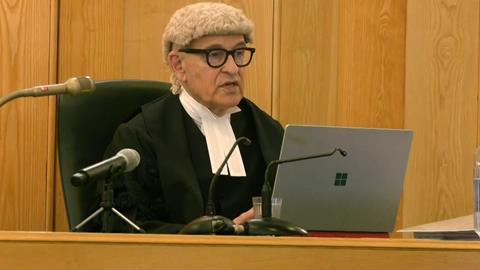On Friday the sentencing by His Honour Judge Richard Marks KC of Jemma Mitchell for the murder of Mee Kuen Chong was shown live from the Old Bailey (pictured above). This was only the second time that sentencing in the Crown court has been broadcast live. The trial has attracted significant media public attention and as a consequence the broadcast of Judge Marks’ remarks have been seen by hundreds of thousands of viewers. It is important to recognise that the broadcasting of the sentencing of Jenna Mitchell for her horrific crimes is a historic development for open justice in England and Wales. As Lord Hewart famously said, 'Not only must justice be done; it must also be seen to be done'. Open justice is a core component of the rule of law, which can only be secured through the coordinated actions of the judiciary, the government and parliament.

The Commons Justice Committee has today published a report on ‘Open justice: court reporting in the digital age’. It sets out the challenges and opportunities for the media and the public in reporting on and accessing court proceedings in the digital age. We heard evidence of a significant decline in the media’s coverage of the courts, and particularly local justice in magistrates’ courts, which perform such a vital role in delivering justice. We also heard about the challenges the media face in accessing information on forthcoming cases and court documents, both of which are crucial to being able to report on the workings of the justice system. The report also identifies the opportunities for the advancement of open justice presented by digitisation of both the media and the courts. For example, in 2022 it should be possible for the media and the public to access a single digital portal to find information on the justice system, much in the same way that the public can use parliament’s website to follow the work of both houses.
The report also recognises some of the most important recent achievements for open justice, including the historic first broadcasting of sentencing remarks from the Crown court on 28 July this year. It is difficult to overstate the potential effect this may have on the public’s understanding of the justice system in England and Wales. While the public has a right to attend Crown court proceedings, and sentencing remarks are frequently published, the reach of live broadcasting is so much greater. The broadcasting of the remarks of both Judge Marks and of Judge Sarah Munro KC in the Ben Oliver case in July were clear, powerful and reflected the gravity of the proceedings. I have no doubt that this will increase the public’s confidence in the justice system and, in particular, in sentencing. It is important to recognise all of those involved in delivering this step forward for open justice, the judiciary, the government and the media have all worked together over a long period to make this happen.
Finally, we should note that there are limits on open justice; the broadcasting of proceedings should never put justice at risk. The decision to broadcast only the sentencing remarks and to ensure that the judiciary has complete control over the decision as to which remarks should be broadcast are vital safeguards. In the digital age, advancing open justice is crucial to ensure that the public are aware of the justice that is done in their name. The justice system is not always given the political and public attention it deserves, but by making the most of the opportunities presented by the digital age we can go some way to ensuring it does.
































3 Readers' comments